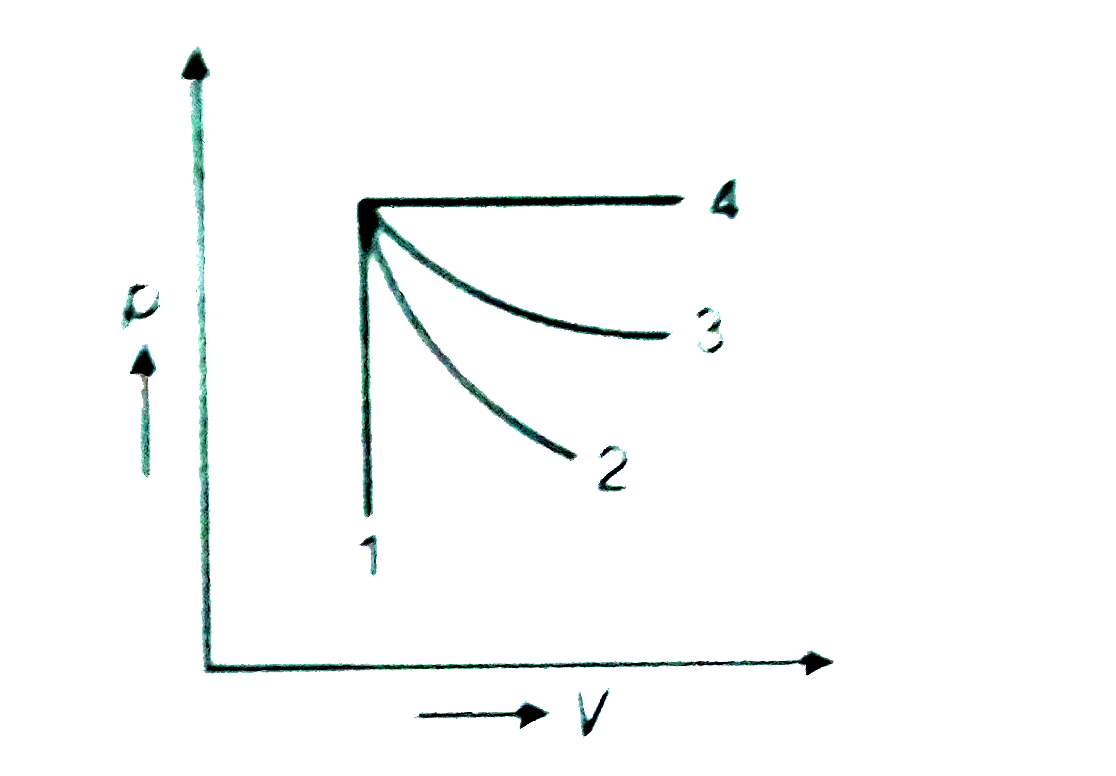An ideal gas undergoes four processes: isochoric, isobaric, isothermal and adiabatic. In which process is (i) the change in internal energy zero?Solution in Bengali
Internal energy of an ideal gas does not change when the temperature is constant. So the corresponding process in an isothermal process.
Topper's Solved these Questions
- FIRST AND SECOND LAW OF THERMODYNAMICSBOOK - CHHAYA PUBLICATIONCHAPTER - FIRST AND SECOND LAW OF THERMODYNAMICSEXERCISE - Exercise - Multiple Choice Questions (Mark 1)
31 Videos
- FIRST AND SECOND LAW OF THERMODYNAMICSBOOK - CHHAYA PUBLICATIONCHAPTER - FIRST AND SECOND LAW OF THERMODYNAMICSEXERCISE - Exercise - Very Short Answer Type Questions (Mark 1)
53 Videos
- FIRST AND SECOND LAW OF THERMODYNAMICSBOOK - CHHAYA PUBLICATIONCHAPTER - FIRST AND SECOND LAW OF THERMODYNAMICSEXERCISE - Section Related Questions
50 Videos
- EXPANSION OF SOLIDS AND LIQUIDSBOOK - CHHAYA PUBLICATIONCHAPTER - EXPANSION OF SOLIDS AND LIQUIDSEXERCISE - CBSE SCANNER
2 Videos
- FRICTION BOOK - CHHAYA PUBLICATIONCHAPTER - FRICTION EXERCISE - CBSE SCANNER
7 Videos
Similar Questions
When a bullet of 6g mass hits a target at a speed of 400m⋅s−1, 70% of its energy is converted into heat. The value of heat generated is
View SolutionWhich branch of physics deals with the study of relationship between heat and various form of energy?
View SolutionWhy is heat called a type of energy?
View SolutionShow that the coefficient of superficial expansion of a rectangular sheet of the solid is twice its coefficient of linear expansion.
View SolutionDefine angle of friction. The inclination θ of a rough plane is increased gradually. The ply on the plane just comes into motion when inclination θ becomes 30∘. Find coefficient of friction. If the inclination is further increased to 45∘ then find acceleration of the body along the plane. (g = 10 m.s−2)
View SolutionAssertion: For an ideal gas in a cyclic process and in an isothermal process change in internal energy is zero.
Reason: In both processes there is no change in temperature.
View SolutionDoes the internal energy of an ideal gas change in an isothermal process? In an adiabatic process?
View SolutionAn ideal gas undergoes for different processes from the same initial state (figure). Four processes are adiabatic, isothermal, isobaric and isochoric. Out of 1, 2, 3 and 4 which one is adiabatic ?
View SolutionChange in internal energy in an isothermal process for ideal gas is
View SolutionAn ideal gas undergoes for different processes from the same initial state (figure). Four processes are adiabatic, isothermal, isobaric and isochoric. Out of 1, 2, 3 and 4 which one is adiabatic ?

View Solutionएक परमाण्विक आदर्श गैस (monatomic ideal gas) का एक मोल (one mole), चार ऊष्मागतीय प्रक्रमों (thermodynamic processes) से गुजरता है, जैसा कि नीचे PV व्यवस्था चित्र (schematic diagram) में दर्शाया गया है। यहाँ दिये गये प्रक्रमों में एक समदाबीय (isobaric), एक समआयतनिक (isochoric), एक समतापीय (Isothermal) और
View SolutionWhat are isobaric, isochoric, isothermal and adiabatic processes?
View SolutionAn ideal gas undergoes four processes: isochoric, isobaric, isothermal and adiabatic. In which process is (ii) the work done zero?
View SolutionAn ideal gas undergoes four processes: isochoric, isobaric, isothermal and adiabatic. In which process is (iii) the heat exchange zero?
View SolutionAn ideal gas undergoes four different processes from the same initial state as shown in figure of P-V diagram. Four processes are adiabatic, isothermal, isobaric and isochoric. Out of 1,2,3 and 4 which one is adiabatic ?
View Solution
